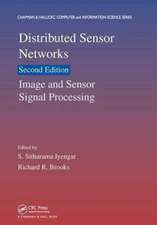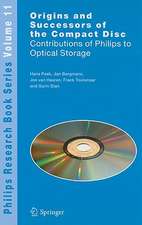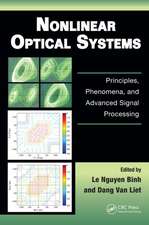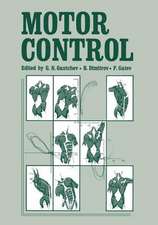Digital Baseband Transmission and Recording
Autor J.W.M Bergmansen Limba Engleză Hardback – 31 oct 1996
The main features of Digital Baseband Transmission and Recording include:
- a survey of digital subscriber lines and digital magnetic and optical storage;
- a review of fundamental transmission and reception limits;
- an encyclopedic introduction to baseband modulation codes;
- development of a rich palette of equalization techniques;
- a coherent treatment of Viterbi detection and many near-optimum detection schemes;
- an overview of adaptive reception techniques that encompasses adaptive gain and slope control, adaptive detection, and novel forms of zero-forcing adaptation;
- an in-depth review of timing recovery and PLLs, with an extensive catalog of timing-recovery schemes.
Featuring around 450 figures, 200 examples, 350 problems and exercises, and 750 references, Digital Baseband Transmission and Recording is an essential reference source to engineers and researchers active in telecommunications and digital recording. It will also be useful for advanced courses in digital communications.
| Toate formatele și edițiile | Preț | Express |
|---|---|---|
| Paperback (1) | 1563.28 lei 6-8 săpt. | |
| Springer Us – 7 dec 2010 | 1563.28 lei 6-8 săpt. | |
| Hardback (1) | 1612.86 lei 6-8 săpt. | |
| Springer Us – 31 oct 1996 | 1612.86 lei 6-8 săpt. |
Preț: 1612.86 lei
Preț vechi: 1966.90 lei
-18% Nou
Puncte Express: 2419
Preț estimativ în valută:
308.62€ • 322.88$ • 256.37£
308.62€ • 322.88$ • 256.37£
Carte tipărită la comandă
Livrare economică 02-16 aprilie
Preluare comenzi: 021 569.72.76
Specificații
ISBN-13: 9780792397755
ISBN-10: 0792397754
Pagini: 634
Ilustrații: XVI, 634 p.
Dimensiuni: 156 x 234 x 41 mm
Greutate: 2.41 kg
Ediția:1996
Editura: Springer Us
Colecția Springer
Locul publicării:New York, NY, United States
ISBN-10: 0792397754
Pagini: 634
Ilustrații: XVI, 634 p.
Dimensiuni: 156 x 234 x 41 mm
Greutate: 2.41 kg
Ediția:1996
Editura: Springer Us
Colecția Springer
Locul publicării:New York, NY, United States
Public țintă
ResearchDescriere
Digital Baseband Transmission and Recording provides an integral, in-depth and up-to-date overview of the signal processing techniques that are at the heart of digital baseband transmission and recording systems. The coverage ranges from fundamentals to applications in such areas as digital subscriber loops and magnetic and optical storage. Much of the material presented here has never before appeared in book form.
The main features of Digital Baseband Transmission and Recording include:
Featuring around 450 figures, 200 examples, 350 problems and exercises, and 750 references, Digital Baseband Transmission and Recording is an essential reference source to engineers and researchers active in telecommunications and digital recording. It will also be useful for advanced courses in digital communications.
The main features of Digital Baseband Transmission and Recording include:
- a survey of digital subscriber lines and digital magnetic and optical storage;
- a review of fundamental transmission and reception limits;
- an encyclopedic introduction to baseband modulation codes;
- development of a rich palette of equalization techniques;
- a coherent treatment of Viterbi detection and many near-optimum detection schemes;
- an overview of adaptive reception techniques that encompasses adaptive gain and slope control, adaptive detection, and novel forms of zero-forcing adaptation;
- an in-depth review of timing recovery and PLLs, with an extensive catalog of timing-recovery schemes.
Featuring around 450 figures, 200 examples, 350 problems and exercises, and 750 references, Digital Baseband Transmission and Recording is an essential reference source to engineers and researchers active in telecommunications and digital recording. It will also be useful for advanced courses in digital communications.
Cuprins
Preface. 1. Mathematical Preliminaries. 2. Examples of Digital Baseband Transmission Systems. 3. Characteristics of Digital Baseband Transmission. 4. Baseband Modulation Codes. 5. Linear Equalization. 6. Partial-Response and Decision-Feedback Equalization. 7. Viterbi Detection. 8. Adaptive Reception. 9. Basics of Timing Recovery. 10. A Catalog of Timing-Recovery Schemes. 11. Phase-Locked Loops. Index.






















